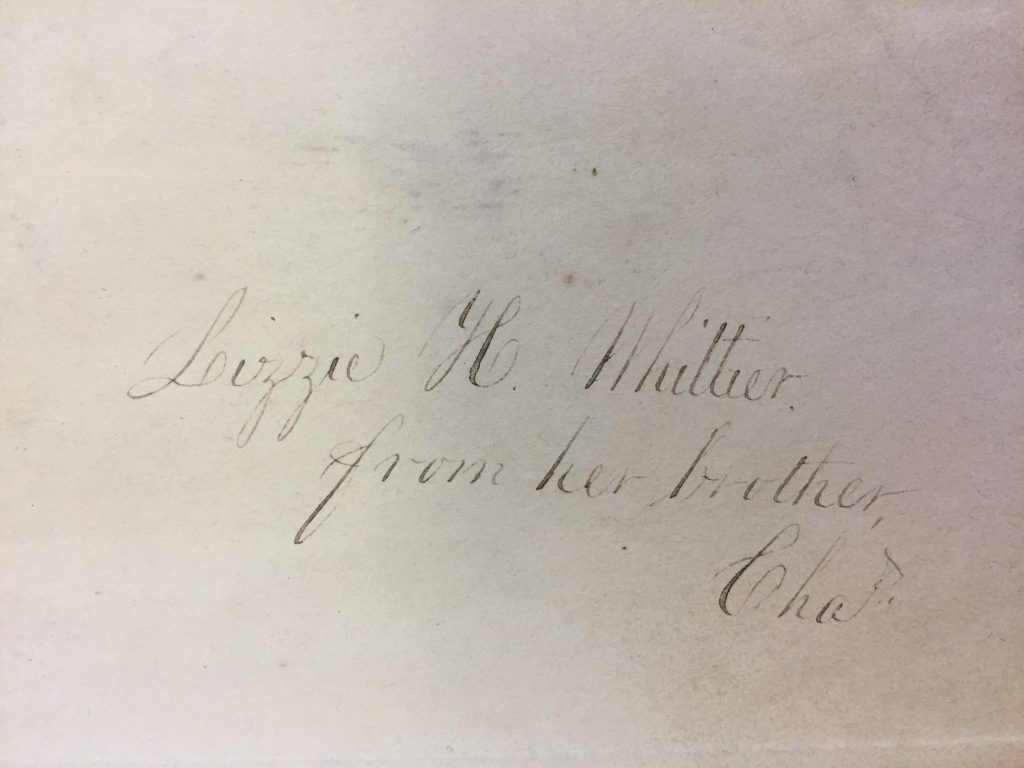By Katie Mackenzie, Museum Studies Summer Intern
In the past few days of my internship I have been able to work on transcriptions for an extraordinary album.
The first thing that stood out to me was the album’s beautiful deep red cover. The gold lettering of the word “Autograph” and the picture of a book and quill that announce the album’s purpose is beautiful.
This Victorian era autograph album contains the signatures of many famous people of the day. Most of the dated signatures are from around the time of the American Civil War. It belonged to Elizabeth Whittier Pickard (1846-1902), who was the niece of the American poet John Greenleaf Whittier (1807-1892). The album was given to Elizabeth by her brother, Charles Whittier (1843-1909).
Lizzie H. Whittier
From her brother
Char.
Her uncle, John Greenleaf Whittier, as a famous poet, may have helped to fill the album with the autographs of his famous friends and correspondents. There are a few letters that are written to John Greenleaf Whittier included in the album.
There are several types of autographs found in the book. Some of the autographs simply include the person’s name. Some of the autographs are attached to a letter, or cut out of one. But what I found most interesting were the names that came with a quote. When a signer added a quote it was sometimes from their own work.
The autograph from Nora Perry, an American writer, came with a quote from her own poem. The excerpt of her poem “The Love-Knot” reads,
Tying her bonnet under her chin
She tied a young man’s heart within
Nora Perry
But most often a famous quote came from another source, such as the Bible, and usually contained a moral message.
Very rarely, the quote comes in the form of a unique poem. One of my favorite quotes in the album was a unique poem written just for Elizabeth. This poem was written by the American author and poet Lucy Larcom (1824-1893). The poem reads,
For the name thou bearest
Tender love thou sharest.
Hold it sacred unto death
The dear name – Elizabeth.
Elizabeth probably did hold her name as something very sacred to her, as she was named after a beloved and much admired aunt. This admiration can be seen in a letter that her father, M. F. Whittier, who was the younger brother of John Greenleaf Whittier, wrote to her on December 4, 1864. The letter reads,
As far as your nature will allow imitate the beautiful life of the dear Aunt whose name you bear. Strive to love all God’s creatures as she did. Like her be charitable towards the erring – – remembering that “to err is human – to forgive is Divine.”
M.F. Whittier
Some of the most famous autographs in the album are the type that are simply signatures. Examples include Ulysses S. Grant, Henry Wadsworth Longfellow, and Ralph Waldo Emerson.
I was excited to find Robert Browning’s autograph in a letter he wrote to John Greenleaf Whittier in 1856. Elizabeth Browning must have been nearby as her husband wrote the letter, as Robert Browning writes to Whittier that, “I speak for my wife.” The letter is a thank you note to John Greenleaf Whittier for the kind words he wrote of them in a book. The letter reads,
My dear sir,
On returning to England this summer we found a book of manly and beautiful verse, and our names (I speak for my wife in this letter) written, with a kind and gratifying word of sympathy from yourself, in the first page. We are just leaving England again, but you must take our hasty thanks as if they had been more worthily expressed: they are hearty and sincere, at all events – – since acknowledging that you have thus numbered with your friends
Two, proud to be so numbered,
Elizabeth Barrett & Robert Browning

Letter to John Greenleaf Whittier from Robert Browning and Elizabeth Barrett Browning. 20 October 1856.
The autograph letters are some of my favorite because, as well as the autograph, they also included snippets of the everyday life of the person. For example, one of the letters is from John Greenleaf Whittier to Greenleaf Whittier Pickard, who was Elizabeth Whittier Pickard’s son. John writes to his great nephew, telling him that he will collect stamps so that Greenleaf can put them in his stamp album. He also reminds Greenleaf to do well in school. I love letters like this that seem so familiar even to modern eyes. The letter reads,
Dear Greenleaf,
I send a few stamps for thy album, and will try to save more for thee, I hope thee go to school and learn well.
Thy Uncle,
John G Whittier
This autograph album allowed me to learn about many Victorian people who I hadn’t known before. It was so fun to be able to research all the people inside of the book and to learn their stories.










